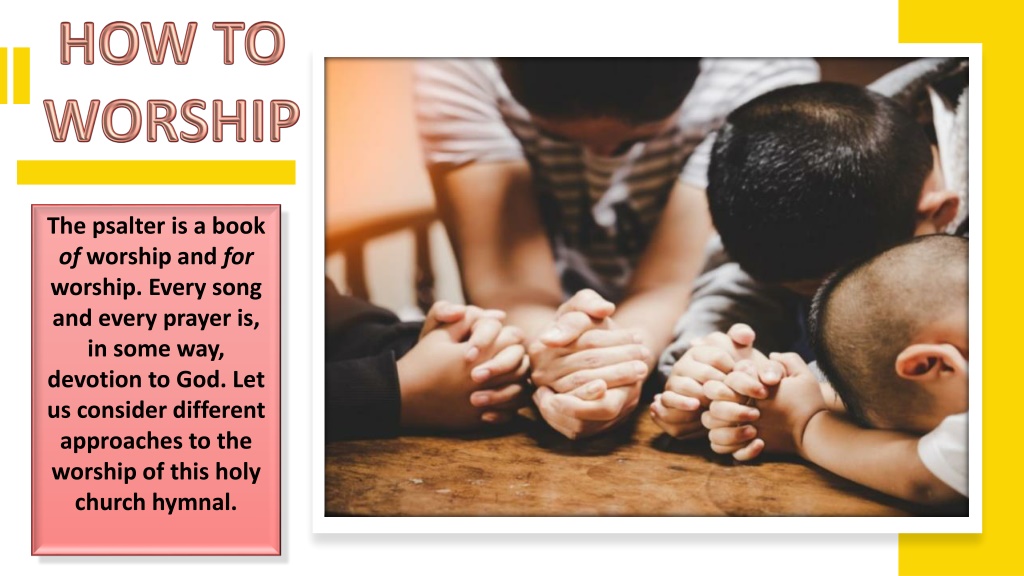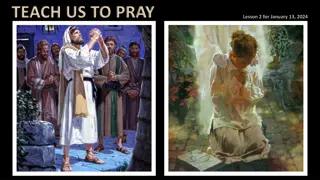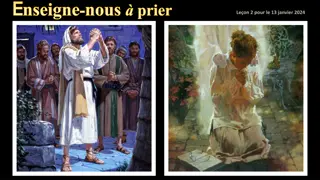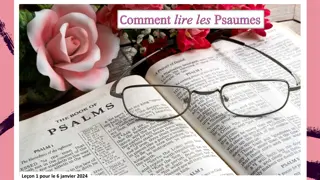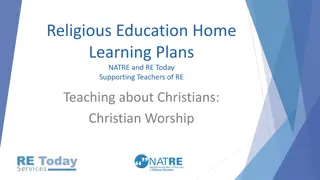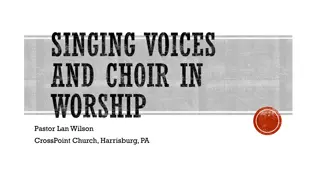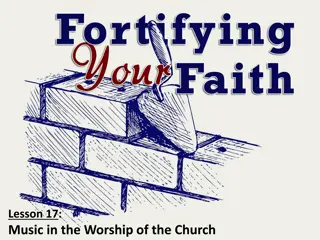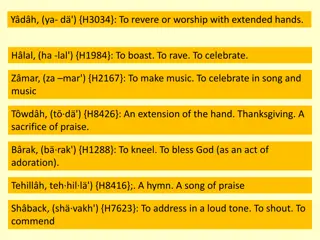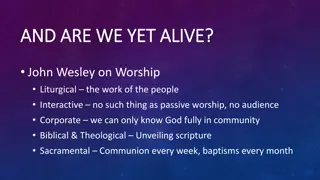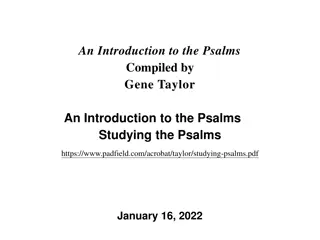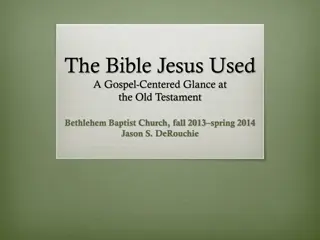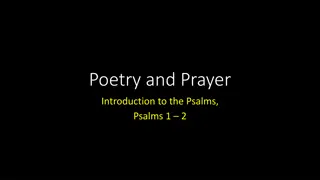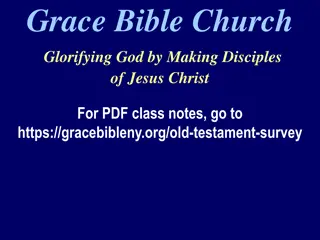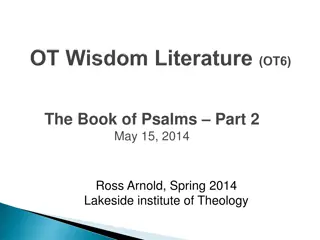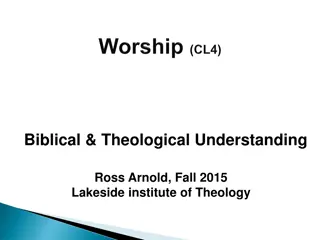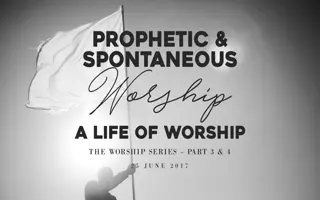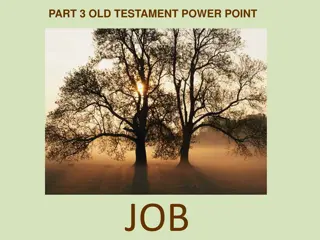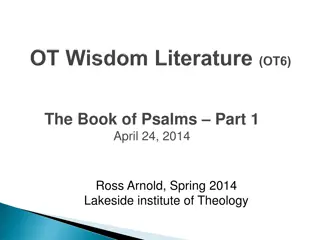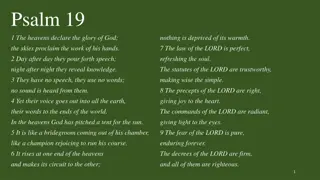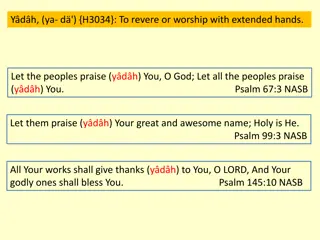Approaches to Worship in the Psalms
The Psalter serves as a guide for worship, emphasizing devotion to God through songs and prayers. Different approaches to worship are explored, focusing on individual, congregational, and wider collective worship in the Psalms.
Download Presentation

Please find below an Image/Link to download the presentation.
The content on the website is provided AS IS for your information and personal use only. It may not be sold, licensed, or shared on other websites without obtaining consent from the author. Download presentation by click this link. If you encounter any issues during the download, it is possible that the publisher has removed the file from their server.
E N D
Presentation Transcript
The psalter is a book of worship and for worship. Every song and every prayer is, in some way, devotion to God. Let us consider different approaches to the worship of this holy church hymnal.
Lord, how they have increased who trouble me! Many are they who rise up against me. Many are they who say of me, There is no help for him in God. Selah The believer finds himself surrounded by enemies who seek evil and think that God will not protect him. But You, O Lord, are a shield [a]for me, My glory and the One who lifts up my head. 4 I cried to the Lord with my voice, And He heard me from His holy hill. Selah But he knows that God protects him and that, when he cries out, He hears him and responds. I lay down and slept; I awoke, for the Lord sustained me. I will not be afraid of ten thousands of people Who have set themselves against me all around. Arise, O Lord; Save me, O my God! For You have struck all my enemies on the cheekbone; You have broken the teeth of the ungodly. Salvation belongs to the Lord. Your blessing is upon Your people. Selah Therefore, he worships him at night and goes to bed peacefully. When he gets up in the morning, he worships God for preserving his life, and renews his trust in Him until the evening. Any time is good to worship God (Ps. 4:3). However, it is good to set aside special times in the day for our worship (Ps. 55:17).
In Psalm 22, we notice that David takes the first-person point of view (Ps. 22:22, 25). The intimacy and immediacy of this view reinforces the notion that congregational worship begins with the individual worshiper. David proclaims: I will declare your name to my brothers; in the midst of the assembly I will praise you (Ps. 22:22). Later, he adds: My praise will be for you in the great assembly; I will pay my vows before those who fear him (Ps. 22:25). What a lesson for us as we seek to enter into the presence of God in worship! Psalm 22 shows us the importance of congregational worship for our faith and vitality. Our children must be made to understand this essential truth when we take them to church. Furthermore, we go to the temple with a spirit of submission, not so much to receive a blessing as to give and be one. While personal consecration is the foundation of our corporate worship, we must equally affirm that church members cannot thrive in isolation. Therefore, the psalmist joins the body of God's people in worship in Psalm 22:22-25. The argument that I can worship at home; I do not need the members of the church dissolves before this passage. Congregational worship brings unity, nurtures love among God's people, and shapes our identity around the world.
WORSHIP IN A WIDER SENSE The last 5 psalms constitute a compendium of worship, an invitation to praise our God together. We praise the Lord because It is our help and hope (Ps. 146:5) He is our Creator and Sustainer (Ps. 146:6; 147:4, 8-9, 16-19) Defend those in need (Ps. 146:7-9; 147:2-3) He upholds the humble and punishes the wicked (Ps. 147:6; 149:5) He meets the needs of his people (Ps. 147:14; 149:7-9) Reign forever (Ps. 146:10) He is great (Ps. 150:2)
WORSHIP IN A WIDER SENSE Who praises him? Each one individually (Ps. 146:1-2) The whole church (Ps. 147:12; 148:14; 149:1) All people (Ps. 148:11-12; 150:6) The angels (Ps. 148:2) Created things (Ps. 148:3-6, 9) Animals (Ps. 148:7-8, 10)
WORSHIP IN A WIDER SENSE How to praise? To the sound of the trumpet (Ps. 150:3a) To the sound of psaltery and harp (Ps. 150:3b) To the sound of tambourine and dance (Ps. 150:4a) To the sound of strings and flutes (Ps. 150:4b) To the sound of resounding cymbals (Ps. 150:5a) To the sound of cymbals of joy (Ps. 150:5b)
